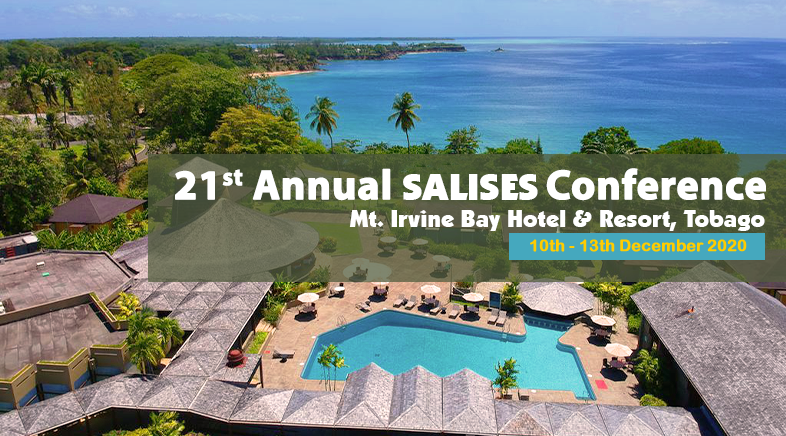Call For Papers
The 21st Annual SALISES Conference invites participants to interrogate contradictions, crises, disconnections and policy implications for the Caribbean region. The influences of global populism and population changes through migration as the region moves into the 2020s could lay the foundations of realignment for traditional party systems and political divisions.
We live in times of great disconnect between Caribbean governments and Caribbean
populations. The systems of government that were adopted at independence in the
Commonwealth Caribbean have failed to deliver inclusive governance. They continue to function in divisive environments that are based on the rotation of power and hegemony between political parties based on majoritarian philosophies, rather than consensus and societal inclusion.
Populism aims to promote national interests, and is less supportive of globalisation,
multilateralism and the free movement of goods, services and labour. It threatens global commitments such as the Sustainable Development Goals (SDGs) and the Paris Climate Agreement. This in turn threatens the global fight against climate change and a shift towards renewable energy, which is expected to bring severe negative consequences including more frequent and destructive natural disasters, loss of bio-diversity, pressure on water production and conservation and land use and planning.
Caribbean labour markets are highly vulnerable to climate shocks, coupled with high and rising unemployment, youth unemployment, dependency on externally-determined commodities prices, low productivity, large technological and digital gaps, a mismatch between the education system, training and the labour market, the provision of decent work, and the emigration of skilled workers.
Small Island Developing States (SIDS) are among the most at risk from rising populist
policies even though they have benefitted tremendously from the trend towards
increasing international openness since the colonial era. They are unable to rely on their small local markets for consumption-driven growth and intra-regional trade. Moreover, there has been an erosion in the Caribbean of the confidence of the 1970s in a regional integration movement and pessimism about its regional benefits today. Caribbean integration remains a work in progress and what has been accomplished so far has not impacted significantly on regional economic growth and development.
In the British, French and Dutch dependencies in the Caribbean, there is no
overwhelming desire to pursue national independence. Simultaneously, the major
challenge in the Spanish-speaking Caribbean that faces the entire region is the crisis in Venezuela and the differing policy responses to it inside and outside of the region.
Concurrent with all of this, there has been a rise of global populism which has seen the referendum vote in favour of the withdrawal of Great Britain from the European Union (BREXIT) on 23rd June, 2016. This was followed by the electoral victory of Donald Trump to become President of the United States (8th November, 2016). On 28th October, 2018, Jair Bolsonaro won the Brazilian presidential election. All three of these elections appear to have been driven by the rise of global populist movements that have impacted countries with which the Caribbean region has had historical associations and their impact will likely be felt in the region.
China has become a primary global actor that embodies globalisation and free trade,
through its “One Belt One Road” initiative, and arguably comes at a cost of higher debt and significant obligations, together with long construction times and environmental concerns. Further, it may catalyse a more volatile Caribbean–China–US geopolitical relationship.
Among future trends, the Caribbean needs to embrace digitization for its future survival. The question is how it will change the way the Caribbean produces goods and services, and how its populations work, live and consume those goods and services.
In a period of tense stability, persistent uncertainty, fragile eco-structures, the politics of populism and an appeal to nationalism globally, and the limits in institutional leadership, the old premise that inspired development in the past has become brittle in the face of new global threats facing countries in their quest to move from survival to sustainability.
How does this new emerging environment, which retreats into nationalistic fervour,
affect Caribbean SIDS which are most vulnerable to the negative fallout?
Contributions are welcomed from academics, policy-makers, civil society groups, media practitioners, and students on the following themes, which are not exhaustive:
Populist neoliberalism
- Climate change, Green Growth and the New Climate Economy
- Migration, Remittances and Diaspora Relations
- Circular Economy, Waste Management and Renewable Energy
- Natural disasters and Disaster Management
- China in the Caribbean
- Big Data, Digitization, and Data Governance
- Digital Finance and Blockchain
- The impact of BREXIT on the Caribbean
- Poverty, Inequality and Social Exclusion
- Health, Aging and Disability
- Sustainable Development Goals: Implementing, Monitoring and Accelerating
- Caribbean Political Systems
- Trade, Integration and Regionalism
- Sports and Culture in Development
- Labour, Social Justice and Decent Work
- Crime, Violence and Citizen Security
- Children and Youth Development
- Debt, Development Finance and Multilateral Agencies
- Sex, Class, Race and Power
- Entrepreneurship, Innovation and Competitiveness
- Water Production and Conservation
- Sustainable Coastlines, Fisheries and Biodiversity
- Sustainable Cities and Land-use Management
Kindly submit your abstracts of no more than two hundred (200) words to
salises2020@sta.uwi.edu by 31st December, 2019.
Notification of acceptance will be given by 31st January, 2020.
Full papers will be due by 31st March, 2020.

